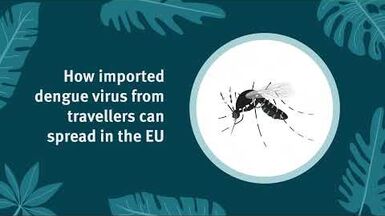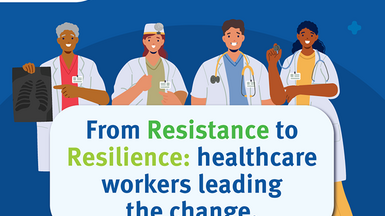Resistance to last-line antibiotics continues to cause concern in Europe
On the occasion of the 7th European Antibiotic Awareness Day, the European Centre for Disease Prevention and Control (ECDC) is releasing its latest EU-wide data on antibiotic resistance (EARS-Net annual report and interactive database).
Carbapenems are a major last-line class of antibiotics used to treat healthcare-associated infections. Although carbapenem resistance remains at relatively low levels for most countries, ECDC data show an increase of carbapenem resistance in Klebsiella pneumoniae from a population-weighted EU average percentage of 4.6% in 2010 to 8.3% in 2013. For the first time in 2013, ECDC monitored resistance to polymyxins (e.g. colistin) in Klebsiella pneumoniae across Europe. Colistin is a last-line antibiotic developed several decades ago that has side-effects and limitations to its use, but has become essential for the treatment of carbapenem-resistant Klebsiella pneumoniae infections. Increasing resistance against colistin is a cause for serious concern and a threat to patient safety.
Vytenis Andriukaitis, European Commissioner for Health and Food Safety said: “The near doubling of resistance in a certain bacteria in three years is truly alarming, and illustrates the need to tackle the issue from all directions. Antimicrobial resistance is one the most pressing public health issues of our time, and as incoming health Commissioner, I pledge to prioritise it throughout my five year mandate”.
ECDC Director, Dr Marc Sprenger, said: “According to our data, resistance to colistin was observed in 5% of Klebsiella pneumoniae isolates for the EU overall. This gives us an important indication of the challenges that patients across Europe are currently facing, including access and use of old antibiotics such as polymyxins when there is a clinical need for their use. Resistance against colistin is already reported in some countries in Europe and this is a worrying development. With a smaller number of effective antibiotics, we are gradually returning to the “pre-antibiotic era”, when bacterial diseases could not be treated and most patients would die from their infection because there was no effective treatment”.
ECDC data also show that the percentage of Staphylococcus aureus resistant to meticillin (MRSA) decreased at EU/EEA level for the period 2010 to 2013, but the decrease was less pronounced compared to the previous four-year period. This trend gives reason for optimism; however, MRSA remains a public health problem in Europe. In 2013, seven out of 30 reporting countries had MRSA percentages above 25%.
Dr Sprenger also added: “Although the vast majority of human consumption occurs in the community, antibiotic consumption in hospitals is a main driver for the spread of multidrug-resistant bacteria responsible for healthcare-associated infections. There is an urgent need for all European countries to look broadly at the continuum of care and tackle several factors related to prudent antibiotic use, from primary care in the community to the most specialised wards in hospitals”.
Today, ECDC is also releasing adaptable campaign materials targeting self-medication with antibiotics. Many Europeans still wrongly believe that antibiotics are effective against colds or flu. The latest Europe-wide survey (Eurobarometer) pointed out that many Europeans use left-over antibiotics from previous prescriptions or try to buy antibiotics without a medical prescription.
To mark European Antibiotic Awareness Day, activities promoting prudent use of antibiotics under the banner “Everyone is responsible, everywhere” are organised in more than 40 countries across Europe during the week of 18 November. ECDC is also cooperating with its partners in other regions of the world. On 18 November, ECDC will coordinate a 24-hour global Twitter conversation around the world hosted jointly by participating organisations from Australia, Canada, New Zealand, the United States and with the participation of the World Health Organization. You can join the global Twitter conversation with the hashtag #AntibioticDay. On 18 November 13:00-14:00 (CET), ECDC will also host a joint Twitter chat (#EAAD) focusing on European issues together with the European Commission, EU agencies and WHO/Europe.
European Antibiotic Awareness Day is a European health initiative coordinated by ECDC which aims to provide a platform and support for national campaigns on the prudent use of antibiotics. Each year across Europe, the European Antibiotic Awareness Day is marked by national campaigns on the prudent use of antibiotics during the week of 18 November. Prudent use means only using antibiotics when they are needed, with the correct dose, dosage intervals and duration of the course. For more information, visit: EAAD website
Self-medication with antibiotics is when you take (or want to take) antibiotics without first consulting a medical doctor by:
- using leftover antibiotics from previous treatments; or,
- getting antibiotics at the pharmacy without a prescription.







